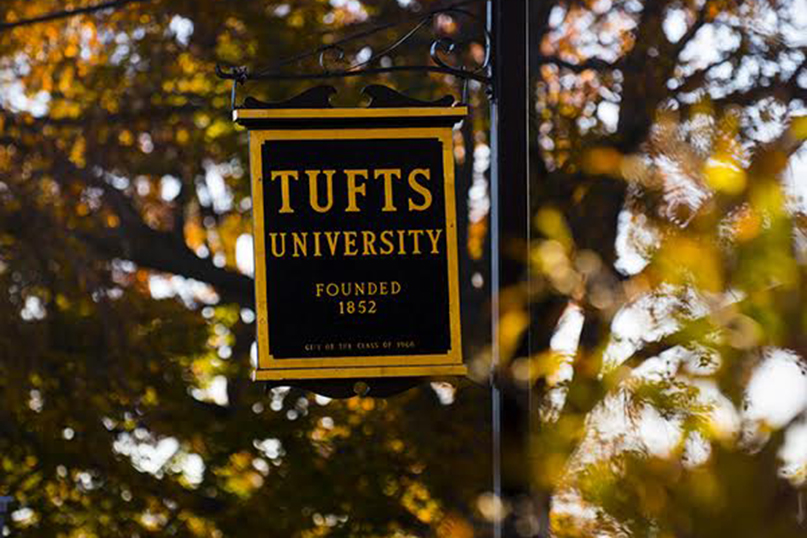
By Jackson Richman
(JNS) A campaign at Tufts University calls for ending the school’s police department’s (TUPD) involvement with the Israeli police force and military.
The referendum is scheduled to be voted on next month and would need 300 signatures to be put on the presidential ballot in the week after the resolution is official submitted to the Tufts Community Union (TCU) Senate. At least one-sixth of the Tufts student body must vote in order for the referendum to succeed.
If the referendum does not garner 300 signatures, the TCU Senate would vote on it as they would any other resolution.
“Students for Justice in Palestine and many other groups are disturbed by Tufts’ participation in the Deadly Exchange,” read the letter from the school’s chapter of Students for Justice in Palestine to the TCU Senate. “We all believe that safety on campus does not start with military trained police, especially not those trained in a country that is deeply rooted in apartheid and human-rights abuses.”
SJP held a seven-day action in November calling for an end to TUPD trips to Israel in the aftermath of then-Tufts executive director of public safety and TUPD chief Kevin Maguire traveling to Israel in December 2017 for a nine-day National Counter-Terrorism Seminar along with a delegation of Massachusetts police officials and agents from both the U.S. Secret Service and U.S. Drug Enforcement Administration.
The SJP-driven initiative at Tufts reflects the BDS-supporting Jewish Voice for Peace’s “Deadly Exchange” campaign that calls for ending cooperation between U.S. law enforcement and their Israeli colleagues.
The JVP campaign was launched in 2017 against what it termed “discriminatory and repressive policing” by both American and Israeli police.
The Anti-Defamation League said, according to the Legal Insurrection report, JVP’s campaign “veers uncomfortably close to age-old anti-Semitic canards about Jews using their influence to undermine the societies of the countries in which they live.”
Academic Engagement Network executive director Miriam Elman told JNS, “Should this referendum pass, it will make Tufts the first university in the country to endorse ‘Deadly Exchange,’ an undeniably anti-Semitic campaign that blatantly traffics in anti-Semitic tropes and canards about Jewish power, money and influence.”
Tufts spokesperson Patrick Collins told JNS that while the university respects “the independence of the TCU Senate process and will await its outcome … we strongly disagree with any characterization that the Tufts University Police Department is ‘militarized.’ ”
To the contrary, he said, “the university and TUPD are on the record as being opposed to militarization, have made community policing a priority for many years, and have policies and training in place that emphasize that everyone, regardless of background, must be treated with dignity and respect.”
He added that “some members of the Tufts community subsequently expressed concern that the university participated in the conference. A number of university leaders met with members of the community to better understand these concerns. The dialogue was helpful, and we appreciated the thoughtful comments contributed by students and others.”
Collins stressed that Tufts is “committed to providing a safe and secure environment in which students, faculty, staff and visitors can live, work and learn safely. TUPD appreciates the collaboration of community members in helping to achieve these goals.”
‘Narrative injects anti-Israel hate and divisiveness onto campus’
Pro-Israel groups slammed the Tufts SJP campaign.
Academic Engagement Network executive director Miriam Elman told JNS, “Should this referendum pass, it will make Tufts the first university in the country to endorse ‘Deadly Exchange,’ an undeniably anti-Semitic campaign that blatantly traffics in anti-Semitic tropes and canards about Jewish power, money and influence.”
“The campaign, which has been heavily promoted by vehemently anti-Israel activists and organizations for over three years now, is moving rapidly from municipalities onto campuses,” added Elman. “But Tufts is the first campus where we are seeing not only events to promote the campaign, but a campus-wide student referendum which will in all likelihood be up for a vote in April.”
“Exchange programs like the National Counter-Terrorism Seminar are intended to train law enforcement about the latest and most effective practices in preventing and preparing for emergency terrorist situations,” AMCHA Initiative co-founder and director Tammi Rossman-Benjamin told JNS. “Executives from law-enforcement agencies throughout New England attended to learn from the best of the best so that they can keep our citizens safe, and Tufts police specifically signed up to make sure they are best prepared to keep Tufts students safe.”
“SJP is manipulating this as another opportunity to push a narrative that injects anti-Israel hate and divisiveness onto campus,” she continued. “Which is why it comes as no surprise that the ‘Deadly Exchange’ program has been exposed as a virulently anti-Semitic campaign that uses classic anti-Semitic canards of Jewish power and blood libel to demonize Israel and Israel’s supporters. That was exactly SJP’s intent: to target and harass Jewish students and to suppress and marginalize their voices on campus.”
StandWithUs CEO Roz Rothstein explained it to JNS as “an anti-Semitic conspiracy theory which can only harm the fight for racial equality and criminal-justice reform. Those who promote it have no concrete evidence to support their claims. They are lying to the public in order to dehumanize Israelis and Jews. Tufts should be ashamed that this hate is gaining any traction on campus and the administration has an obligation to unequivocally condemn it and take concrete steps to protect Jewish students.”
Scholars for Peace in the Middle East executive director Asaf Romirowsky emailed JNS that the campaign “is yet another example of falsehoods and propaganda where pro-BDS groups like JVP and SJP blame brutality and discriminatory policing practices (which of course are practiced in Israel) on U.S.-Israeli relations citing exchange programs between the U.S. police departments and the military” with the Israel Defense Forces, even though “such joint programs between the U.S. armed services and Israeli one both domestic and overseas have saved and protected countless American servicemen and women in Iraq, Afghanistan and elsewhere.”
Main Photo: A Tufts University sign at the intersection of College Avenue and Professors Row on Nov. 4, 2015. (Credit: Alonso Nichols/Tufts University.







 Southern New England Jewish Ledger
Southern New England Jewish Ledger













